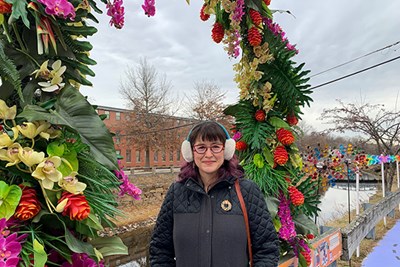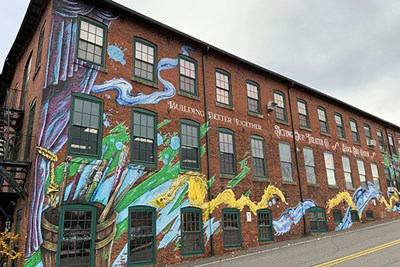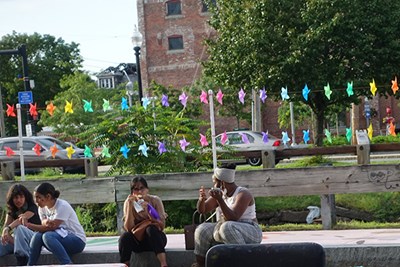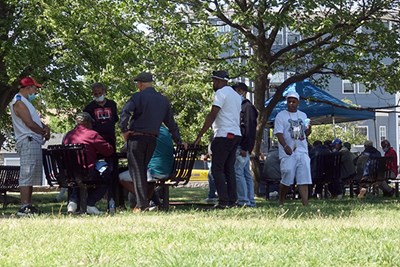'Joyful Cities' project aims to make public spaces more welcoming for people of color
Teresa Gonzales awarded Ford Foundation support for ethnographic work with students

Sociology Asst. Prof. Teresa Gonzales grew up in Chicago’s Pilsen neighborhood, a predominantly Mexican American area on the city’s Lower West Side.
When gentrification began pushing out Pilsen’s lower-income residents and changing the neighborhood’s complexion, Gonzales wanted to understand the forces behind that – and what community activists and residents could do about it.
As a sociology Ph.D. candidate at the University of California Berkeley, she did extensive ethnographic research on community development efforts in two Chicago neighborhoods: Little Village, a Mexican American community near Pilsen, and Greater Englewood, a predominantly Black area on the South Side.
“I spent two-and-a-half years conducting interviews to understand development in that city,” she says. “There was a weird thread that kept emerging: Community activists and residents said they wanted to create spaces of joy so they can be outside, feel safe and have fun.”
They also wanted to change the dominant narrative: that their neighborhoods were locations of poverty and violence in need of rescue through redevelopment – and that anywhere young people of color gathered, it meant trouble, she says.

Her book on that research, “Building a Better Chicago: Race and Community Resistance to Urban Redevelopment,” was published last fall by New York University Press.
Now, thanks to a Ford Foundation fellowship, Gonzales is turning her ethnographic lens on how residents of predominantly Latino “gateway” cities in Massachusetts use public spaces, especially outdoor spaces like parks, for leisure. And she’s involving undergraduate students in her research.
“The goal is to partner with the city, get residents involved and ultimately get people outside and enjoying themselves,” she says, with a focus on making public spaces more welcoming for Black and Latino residents.
She’s starting her “Joyful Cities” research in Lawrence, which is about 80% Hispanic. She hopes to expand it over the next few years to Chelsea, Holyoke and Lynn.
“I’m looking at the various ways Black and brown communities engage in leisure and public forms of playfulness as a way of building community and social cohesion, and how they reclaim public spaces for celebration,” she says.

The Ford Foundation fellowship for pre-tenured faculty is affording Gonzales a year’s sabbatical for focused research, while a university seed grant is paying for several students to assist her. She also taught a small class in ethnographic field research methods last fall. Several students in the class helped with Gonzales’ research in Lawrence, while two partnered on a preliminary study of Chelsea.
Debby Fernand, an honors student who graduated in December with a double major in sociology and psychology and a minor in race and ethnic studies, worked for Gonzales as a research assistant over summer 2021 and then took her class in the fall.
Fernand observed Lawrence’s public parks and described the amenities they offered, how well they were maintained and who was using them on different days and at various times. Then she learned how to code those observations.
Fernand, who’s now studying for a master’s degree in applied sociology at UMass Boston, says she appreciated the chance to get such extensive research experience – and was interested to find that while men felt comfortable playing and relaxing in the parks, women did not.

“We saw men of color playing dominoes, baseball and basketball in the parks, and women just passing through and not really using these spaces,” she says.
Senior sociology major Rosmery Medrano, a Dominican American student who grew up in Lawrence and took Gonzales’ class in the fall, says she found it eye-opening to analyze her own city and culture from the multiple perspectives of gender, race and culture.
The domino tables in one corner of Lawrence’s Campagnone Park were always busy with men playing and watching the games, she says. If women were there, they were watching their children or waiting on the men in their families, she says.
“They were mostly hanging out at the shaved ice stand and going up to the men and asking, ‘Do you want this? Do you want some coffee?’ One time, I actually saw a woman with a household broom sweeping the park,” Medrano says. “In my culture, if you’re a woman and you’re not doing anything, if you’re not actively cleaning or cooking or taking care of a kid, they’ll automatically categorize you as lazy.”
Najifa Tanjeem, a Ph.D. student from Bangladesh who's in the Global Studies Program, spent 150 hours observing in nine different parks in Lawrence and at nine community events last summer as a research assistant for Gonzales. She hopes to resume this summer, when the project will move into the next stage: conducting detailed interviews with residents, community activists and other stakeholders.
Tanjeem, who doesn’t understand Spanish, says the most important thing she’s learned so far was how to check her own biases while making field observations – for example, by not making assumptions when people raised their voices.
“Maybe they could be happy, or friendly, or excited to see each other,” she says. “Just because their voices were loud doesn’t mean they were angry.”